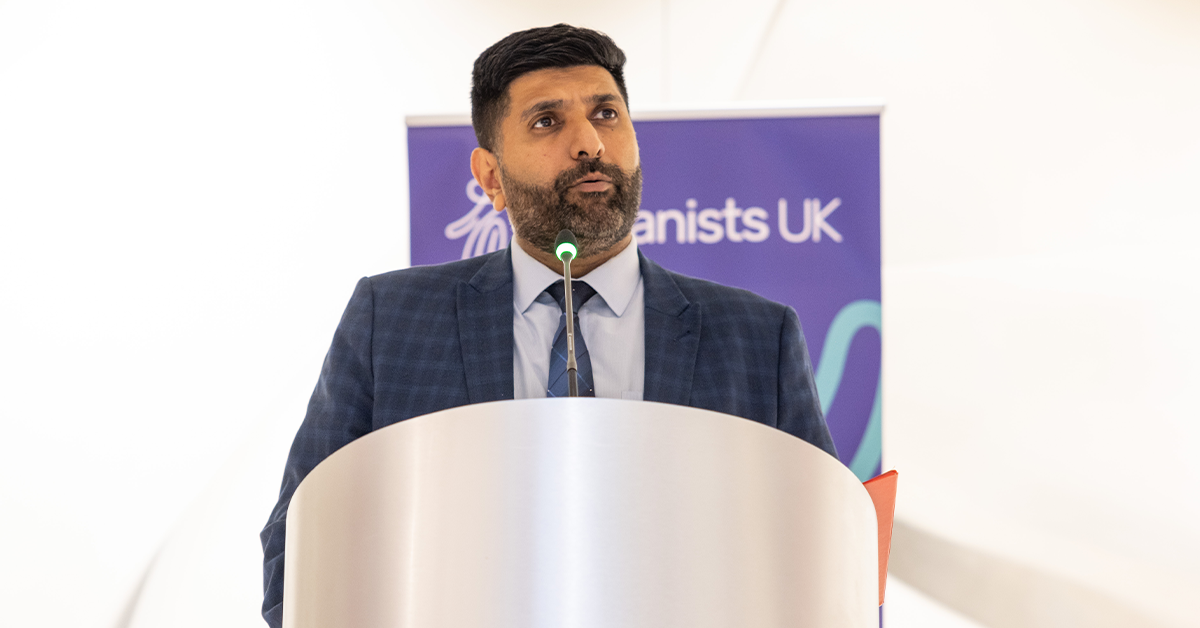
Humanists UK welcomes the Government’s recent clarification that the All-Party Parliamentary Group (APPG) for British Muslims’ proposed definition of Islamophobia is ‘not in line’ with the Equality Act 2010. This important statement was made by Faith Minister Lord Khan in a letter to the Network of Sikh Organisations (NSO).
Humanists UK had previously expressed concern about the definition for its failure to distinguish between prejudice against people and legitimate criticism of beliefs. The Government’s statement, confirming that the definition ‘is not in line with the Equality Act 2010, which defines race in terms of colour, nationality, and national or ethnic origins’ addresses a key issue Humanists UK has highlighted. The letter also emphasises the importance of free speech, asserting that the Government’s approach to combating religious hatred ‘would never inhibit the lawful right to freedom of expression’, including the freedom to discuss and critique religion.
The definition proposed by the APPG for British Muslims states that ‘Islamophobia is rooted in racism and is a type of racism that targets expressions of Muslimness or perceived Muslimness.’ However, Humanists UK believes that this definition (and in particular the tests proposed alongside it) requires improvement because it does not sufficiently differentiate between (i) prejudice and discriminatory actions against people who identify or are identified as Muslim, and (ii) criticism of the beliefs, ideas, and practices that might fall under the umbrella of Islam. It poses a risk to legitimate freedom of speech and thought and of religion or belief and it also threatens to give inadvertent succour to extreme Islamic groups abroad, including some Islamic states at the UN who use accusations of Islamophobia to silence criticisms of the human rights abuses they perpetrate.
It also fails to consider the impact upon former Muslims, for whom being able to question, criticise, and openly oppose Quranic teachings and expressions of Muslimness can be an important aspect of their identity, help them to come to terms with religious abuse they may have experienced, and is a legitimate expression of their new religion or belief. Humanists UK provides a dedicated helpline for people who have experienced violence, shunning, or ostracism for questioning or leaving a religion.
Humanists UK Director of Public Affairs and Policy Richy Thompson said:
‘We are concerned that the proposed definition of Islamophobia fails to protect individuals from discrimination while also safeguarding the right to critique harmful beliefs and practices. We are pleased that the Government has recognised this and opted for an approach more consistent with the principles of free speech and equality.’
Prejudice against Muslims in the UK is widespread and must be addressed. Humanists UK has worked to tackle such prejudice by supporting the introduction of the Equality Acts of 2006 and 2010 and the Racial and Religious Hatred Act 2006; by conducting extensive dialogue work with Muslim groups; and by speaking out repeatedly against atrocities experienced by Muslims on grounds of their identity around the world, including in relation to the recent riots.
Notes
For further comment or information, media should contact Humanists UK Director of Public Affairs and Policy Richy Thompson at press@humanists.uk or phone 0203 675 0959.
Read more about our work on freedom of speech and expression.
Humanists UK is the national charity working on behalf of non-religious people. Powered by over 120,000 members and supporters, we advance free thinking and promote humanism to create a tolerant society where rational thinking and kindness prevail. We provide ceremonies, pastoral care, education, and support services benefitting over a million people every year and our campaigns advance humanist thinking on ethical issues, human rights, and equal treatment for all.
